
MOSCOW -- On Sept. 18, the Russian Federation held elections for the seventh session of the lower house of parliament. The political body, known as the State Duma, will now consist of only four political parties and will be dominated by the current government's party, United Russia, despite a noticeably declining standard of living across the country and the implementation of sanctions. The Communist Party, the nationalist Liberal Democratic Party of Russia and A Just Russia party will also hold seats. Support for United Russia in this election even as sanctions prevented the importation of food from the European Union and other nations seems to suggest a strengthening of President Vladimir Putin's reach, an impressive ability to incite nationalism and a much larger likelihood of his victory in the upcoming presidential elections.
"At a time of difficulties, considerable uncertainty and risks, people naturally choose stability and trust the leading political force," said Putin following the vote. "The results ... are also citizens' reaction to external attempts to pressure Russia, to threats, to sanctions, and to foreign attempts to stir up the situation in our country."
While a few other parties also secured single-seat constituency, United Russia, the party associated with Putin, still took enough seats to achieve a constitutional majority and can now alter the Russian constitution without the vote of other political parties.
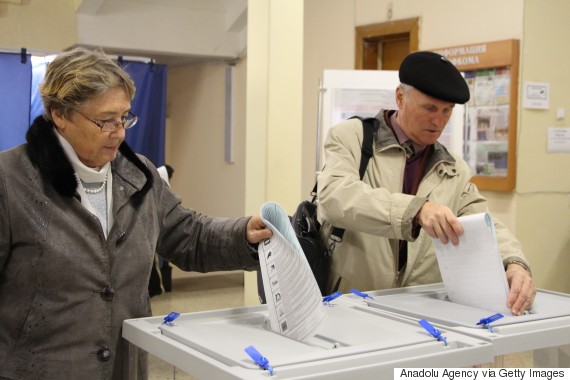
Is Putin right that Russians favor him even after resources are cut off from them because they trust the government to make the right decisions, or is there something else at play here?
A new record of popularity of the pro-Kremlin political party could be surprising given the current economic crisis, which has troubled Russia since 2014. Usually the negative macroeconomic environment would reduce the motivation of the voters to vote for the ruling political party, as some international studies have noted. However, as the recent elections and a study done by the Russian Public Opinion Research Center, or VTsIOM, show -- in Russia, this rule works in reverse.
The same study also suggested that in periods of rising inflation the number of Russians who are ready to vote for United Russia increases. Potential support for President Vladimir Putin's electorate also gets a boost.
The especially high level of inflation has become a noticeable part of Russian everyday life.
During the last couple of years, the especially high level of inflation has become a noticeable part of Russian everyday life. This has come in part not from Russian economy policy, but from Russia's relationship with the international community. One important manifestation of this has been the economic impact of Russia's annexation of Crimea, an event that despite its devastating economic impacts has given a boost to Russian support of Putin and the United Russia party.
This August marked two years since Putin's declaration that Russia would prohibit food imports from the EU and some other nations. And earlier this year, EU sanctions on Russian were prolonged until 2017. Both continue to have ripple effects beyond their own countries.
The International Effect Of Putin's Food Import Ban
The story of the sanctions standoff, later called an "EU-Russia economic war," started when the United States and a number of European countries established sanctions against Russia in connection with Russia's controversial annexation of Crimea. Soon after, President Putin signed a law in response, establishing food sanctions against countries that had denounced the annexation, including the EU and the U.S. The list of prohibited products included all fruits and vegetables, fish, milk and other dairy products, pork, beef and poultry meat -- 73 percent of which came from the EU.
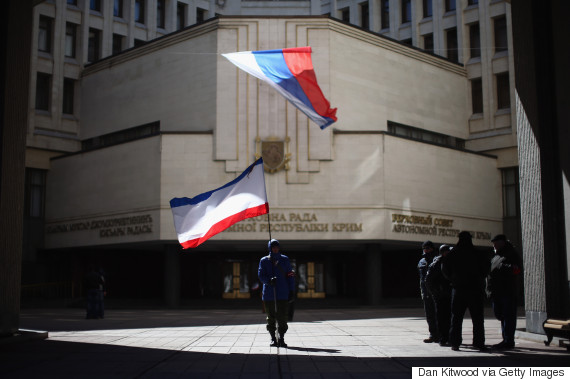
As a political gesture, the ban was a powerful move. The sanctions created significant economic problems for the EU, with trade on the banned products dropping at least 12 percent. According to the Russian Ministry of Economic Development, losses to exporting countries amounted to 8.6 billion dollars, totaling the EU losses at around 0.4 percent of its annual GDP then. According to the Austrian Institute of Economic Research, the introduction of sanctions will cost EU countries some 2 million jobs (around 500,000 in Germany alone).
Italy has seen the impacts of this firsthand. Losses in exports for Italian farmers during the last two years have so far amounted to about 600 euros, according to Gaetano Menna of the main Italian agricultural organization Confagricoltura, which represents and protects local agricultural enterprises.
Michael Lohse from the German Farmers' Association, also known as Deutscher Bauernverband, said that the measurable impact for the first year of the embargo amounted to 1 billion euros for German farmers. But since the end of the first year, agricultural exporters seem to have adapted and diversified, making it more difficult to measure the loss numerically, according to Lohse. A similar decline in the agricultural sector of the economy can be seen in some other European nations, he explained. In some countries, like France, the reaction was even stronger and has become physical.
'Russian sanctions are causing the ruin of the French agro-economy.'
"Russian sanctions are causing the ruin of the French agro-economy. Our farmers have already protested against them a few times," said Phillipe Legrand, who works for a tourist agency in Marseille, France.
A year after the sanctions against Russia started, close to 50 percent of the EU and Eastern Europe felt the sanctions hurt their economies, according to a Gallup poll.
"The effect of Russian food sanctions on EU everyday life was simple -- prices on products, which were banned to export, like vegetables and meat, declined and maybe this had an impact on the current deflation," said Mark Field, an IT programmer living in Berlin.
But many people still favor the sanctions. In countries such as Poland, Romania, Croatia and Estonia, about half or more residents support the sanctions, according to the previously referenced Gallup poll.
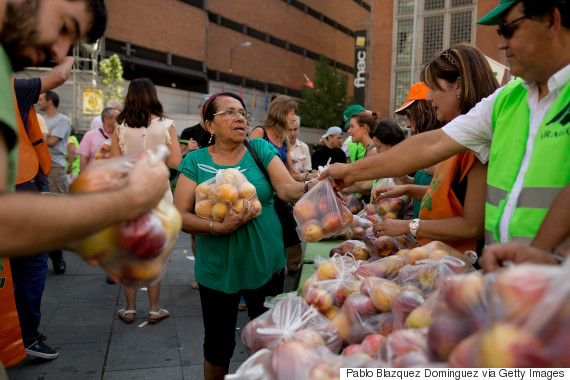
And while many have seen a decline in their economies, countries outside the EU have benefited greatly. In fact, the import ban resulting from the sanctions has strengthened Russian economic relations with Switzerland, Brazil and Turkey. The impacts of an increased Swiss relationship in particular not only hurts the EU in the short term, but will also keep trade relations from full recovery if they are to ever end, according to Michael Lohse. This, he noted, is due to the fact that Switzerland will establish a much stronger relationship with Russia, and it is unlikely to leave the market if sanctions are lifted.
The Situation Inside Russia
Looking at the perspective from inside Russia, however, we see that the social costs of sanctions implementation are very high, and the same moves have had a far worse impact here than in other parts of Europe. One major impact on the quality of life has been a lack of good essential foods available to Russians. Most Russians have noticed products prices rising, and many people indicated a change in purchasing habits as a result. And these perceptions are supported by official government data. According to the Ministry of Economic Development, Russian food prices have gone up by over 30 percent, and have partly resulted in an increase in the number of Russians living below poverty level. In fact, over the last two years the number has risen to around one in seven Russians (19.2 million, 13.4 percent of the total population) that find themselves below the poverty line.
'When we went for holidays to Italy this summer, we brought back with us 14 kilos of cheese and ham.'
The quality of food within the country has also presented problems for Russians as well. According to the Russian agency that regulates animal-related products and sciences, Rosselkhoznadzor, a disturbing amount of dairy products in Russian shops are falsified and contain chalk or starch, especially cheese. The head of the Federal Service for Veterinary and Phytosanitary Surveillance (Rosselkhoznadzor), Dankvert Sergey Alexeevich, has gone so far as to say that the overall proportion of falsification for some types of products, such as sour cream and cheese, can reach 50 percent.
For Ekaterina Pivolova, a biology student from Moscow, it has, for example, "become very difficult to obtain good cheese in Russian shops." And the concerns over value and variety of food extends beyond just cheese.
Dmitry Almelkov, who works in a Moscow bookstore, noted the situation has caused most sea products such as shrimp to disappear as well.
"Most other types of fish that I saw was either very expensive or of low quality," he said.
Some Russians are lucky enough to be able to leave the country and find the food they have missed under the sanctions. And those lucky enough make sure to stock up. Elena Serogova, whose job as a saleswoman allows her to travel, said that this is characteristic of everyone she knows who has the opportunity to go abroad.
"When we went for holidays to Italy this summer, we brought back with us 14 kilos of cheese and ham," she said.
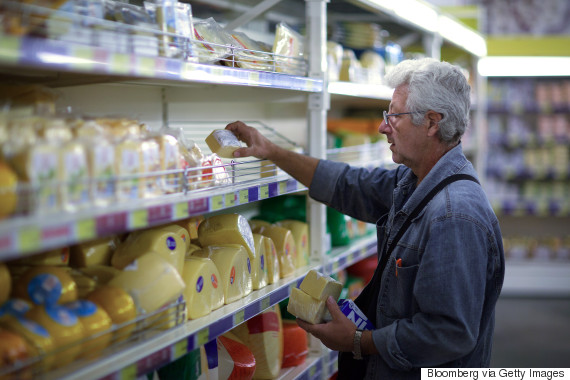
So why then, in spite of the inconvenience his actions have caused to the people of Russia, do they continue to support him, and for how long will this last?
If we cast our minds back a few years to the presidency of Boris Yeltsin, a time when the transition to a market economy was achieved at immense cost, it is easy to see why President Putin's popularity among the middle class has been based on creating economic growth and a higher standard of living for the Russian population. It has been especially important for people, who have lived through the Soviet era of the 1980s that left them earning money, but struggling to find food, only to be followed by the post-Soviet Russia of the 1990s when even the possibility to earn a decent salary had disappeared.
With the ban on import of a number of everyday foods, many Russians have felt this higher standard of living decline, and even felt a regression into these less stable economic times. For these people, the higher standard of living was the main reason to put up with fewer political rights and less room for private freedom. But now this advantage has disappeared and, according to official economic forecasts, it's not going to come back soon.
Putin is lucky that defiance against the EU has ultimately strengthened his position and the standing of the sanctions among Russians.
For those nearly 20 million below the poverty line, the problem still remains that together with other factors, food sanctions have crashed the main advantage of Putin's rule: the rise of standards of living. No longer do they have the main reason to put up with challenges to freedom of speech or the political setbacks. Putin is lucky that defiance against the EU has ultimately strengthened his position and the standing of the sanctions among Russians.
It would be logical to expect that people would start expressing their opinions and try to influence the government policy in a situation such as this, but as the election results show, we see the opposite effect. According to the authors of a Russian Public Opinion Research Center and Ohio State University study, there are at least three possible explanations that explain the result of the sanctions. The most interesting of them, though is one about the West. Some Russians tend to view high inflation as an effect of Western sanctions, not those imposed by Russia. As a result, the majority of Russians do not blame the government. This point of view is depicted by the government, whose reach, through local media, still extends to a larger audience than any other group in the country and thus dominates the Russian perspective today.
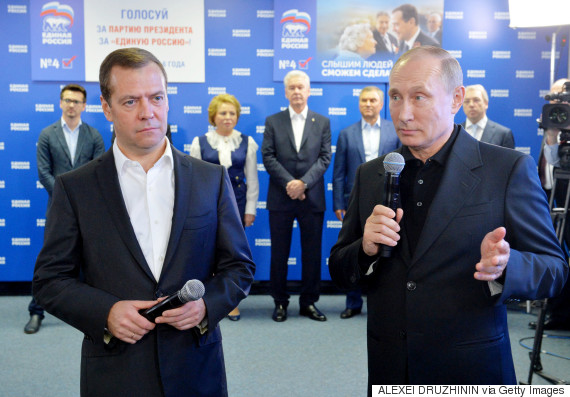
Given this, it is not surprising that most Russians, according to a study by the Levada Center, perceive Putin's import ban as a sign of strength against the West and think it is important to continue. This fact also shows that for many Russians, their idea of Russia's place in the world has changed very little. A large part of the population still seems to think that there is a permanent opposition between Russia and the Western world -- much like the attitudes under the Soviet Union. In that logic, sanctions, of course, are an instrument of power, and it doesn't matter how much harm it can bring to the country itself -- Russia comes first, even if Russia is hurting.
So it seems that President Vladimir Putin knew what he was talking about when commenting on the election results: "Let me say again that this election result is good, but it is without question an advance on the part of our people."
If the tough economic crisis hasn't impacted Putin's popularity, then there is not much else that could. But if inflation falls more in the future, we may just see a change in the political tides.
Earlier on WorldPost:

